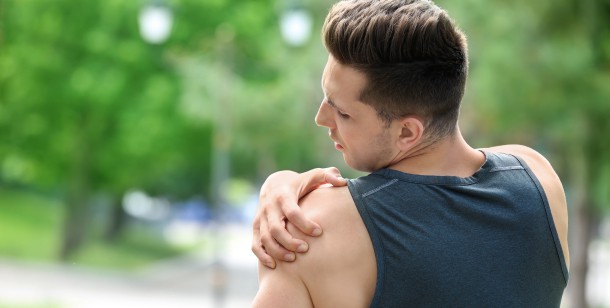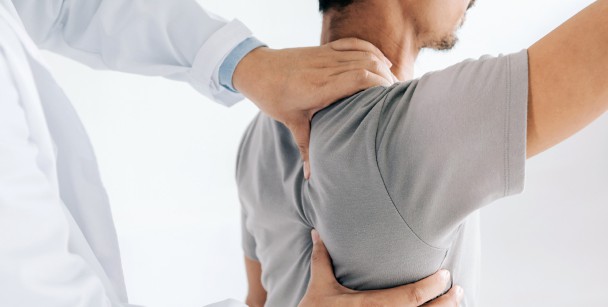Snap. Crackle. Pop. Nope, it’s not the cereal you’re eating—it’s your shoulder. If a shoulder pops when rotating, it can cause discomfort and pain and may lead to serious issues. No matter what you’re feeling in your shoulder, though, the last thing you should do is ignore it. You’re not alone either—shoulder issues are the third most common joint and muscle issue people go to the doctor for. Popping in the shoulder could also be a symptom of an injury or another health condition. No matter the cause, let’s dig deeper into this condition and the best possible treatment options.

What Is a Shoulder Pop?
Referred to as “shoulder crepitus,” shoulder pops are clicking or popping sounds and sensations that occur near the joint that connects to your upper arm. While shoulder joints may seem simple, they are quite complex, complete with muscles, tendons, ligaments, and cartilage that all work in tandem to keep the ball-and-socket joint working properly. This system allows you to have a wide range of motions in your arm, but since there are so many different variables involved, the joint can be easily injured. Crepitus, which is the term for cracking and popping sounds, can happen in nearly any joint, but shoulder crepitus could relate to a number of causes and conditions.

What Causes Shoulder Pops?
If the shoulder pops when rotating, and you begin hearing a popping noise when you move your shoulder, there could be many possible causes. As mentioned before, the joint is made up of a ball and socket, but more specifically, the humerus bone sits under and within the scapula, also known as the shoulder blade. These bones are all connected by four muscles, called the rotator cuff. Finally, cartilage, known as the labrum, helps hold the arm in place.
As you can imagine, this complex system of bones, muscles, and cartilage can be susceptible to a wide array of injuries and conditions. Here are a few of the most common causes:
Cavitation
Cavitation occurs when gas is released from the fluid within the shoulder joint. Sometimes, when you move your arm quickly, the gas escapes causing the popping noise. Typically, there is no pain involved when cavitation occurs.
Labral Tears
Labrum, which is soft cartilage under the shoulder blade, can become torn due to injury or age. These tears can be quite painful and result in popping noises when the arm is moved. The pain is typically constant and worsens with certain activities.
Scapulothoracic Bursitis
Within your shoulder joint, there are several fluid-filled sacs that help your joint and socket move without any resistance. Sometimes, these sacs become inflamed, which may cause pain along with a popping sound.
Rotator Cuff Injuries
The four primary muscles that operate the shoulder joint, also known as the rotator cuff, can easily be injured along with surrounding tendons. Rotary cuff injuries can be caused by a single event or degeneration over time. Either way, they are often painful and associated with shoulder pops.
Osteochondroma
In some cases, the popping noise can be caused by osteochondroma. These are benign growths that develop in the shoulder, scapula, or rib cage. Due to these growths, cracking noises can occur when your arm is raised. More often than not, there are no other notable symptoms.
Osteoarthritis
As we age over time, the soft cartilage that helps pad our bones degenerates, causing your bones to rub up against each other. This friction not only causes shoulder pain but cracking and popping noises when the shoulder joint is moved. In addition, the cracking and grating sound can also be an indication of arthritis.
Treatments & Why It Shouldn’t Be Ignored
First and foremost, it’s important not to ignore shoulder pops. With its numerous causes, it is not something that should be overlooked, as it could be the sign of a much greater issue like arthritis. Thankfully, there are numerous treatments for recurrent shoulder pain and popping, including:
- Massage Therapy
- Physical Therapy
- Bones Adjustment from a Licensed Chiropractor
- Anti-Inflammatory Medications
- Corticosteroid Injections
- Over-the-Counter Pain Relievers for Mild Cases
In addition, if your shoulder popping does not cause pain or only causes minor discomfort, you can try a number of home remedies. Some of these remedies include having a better posture, practicing yoga, using foam rollers, and applying cold compresses. Of course, before trying home remedies, we highly recommend seeking the advice of a medical professional. If your shoulder pops when rotating, this is a good indicator that you should visit a knowledgeable physician to find the root cause of the issue. Whether it’s due to age or sports injuries, it is vital to receive a professional diagnosis. This will grant you significant insight into what treatments to pursue and possibly what activities to avoid.

